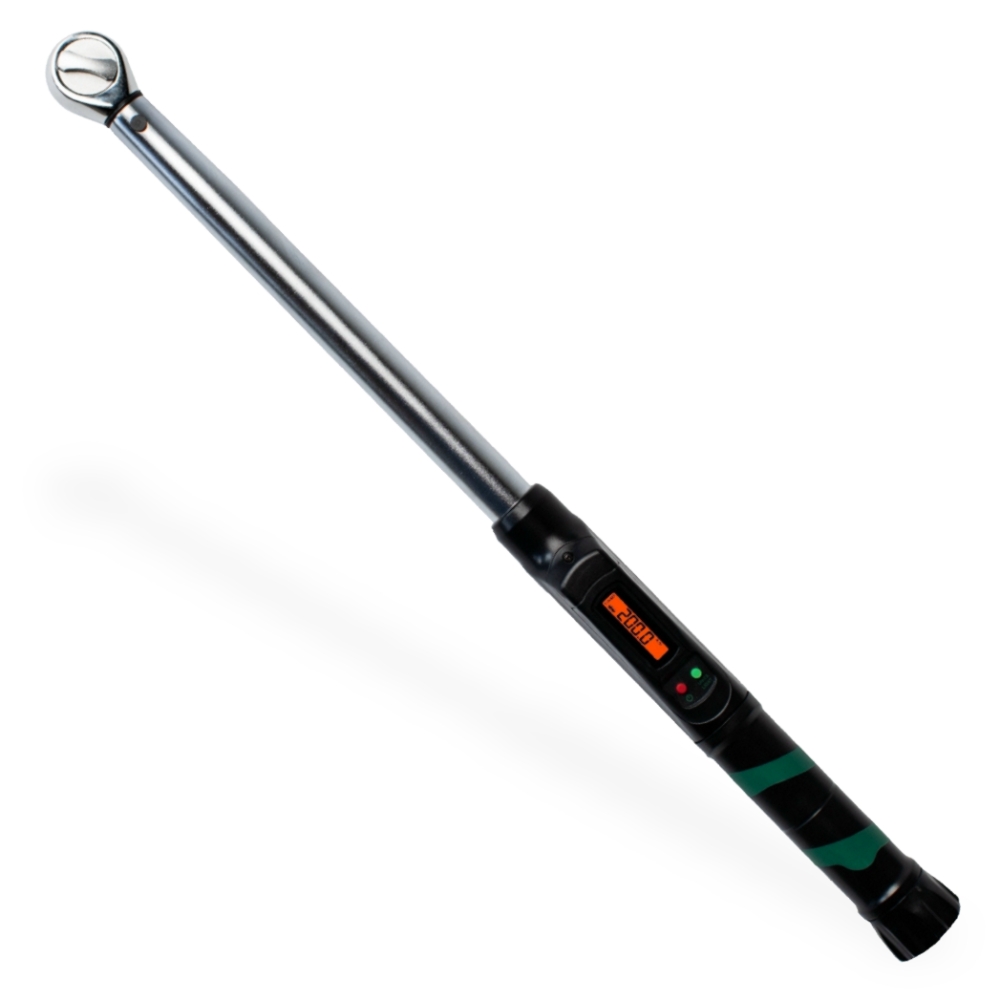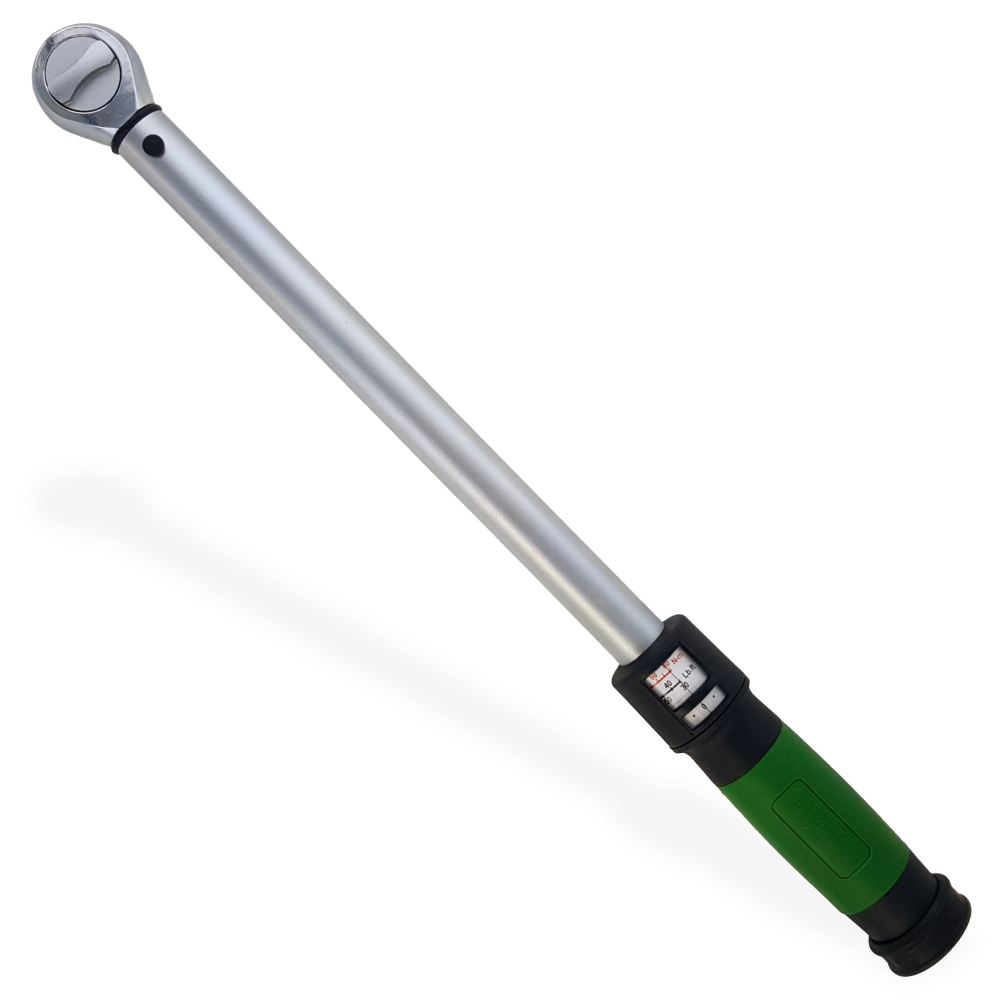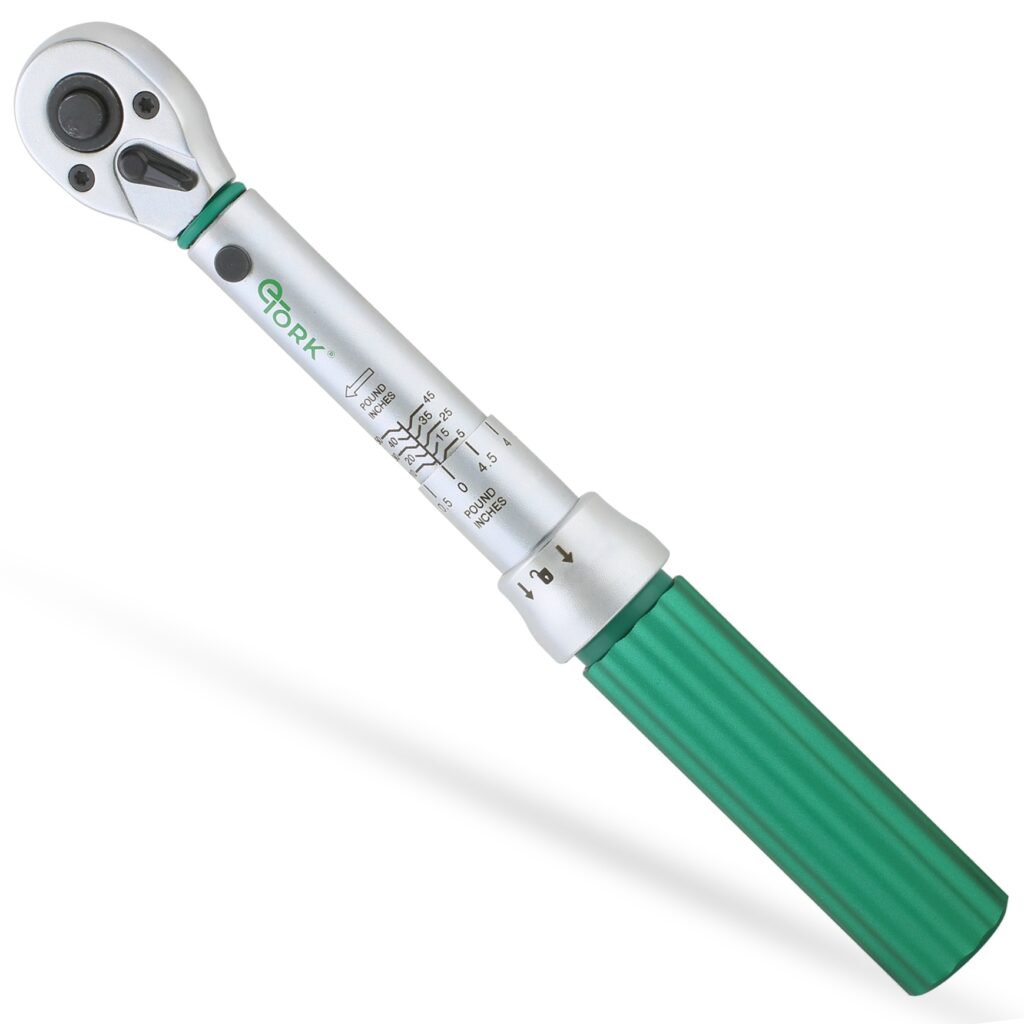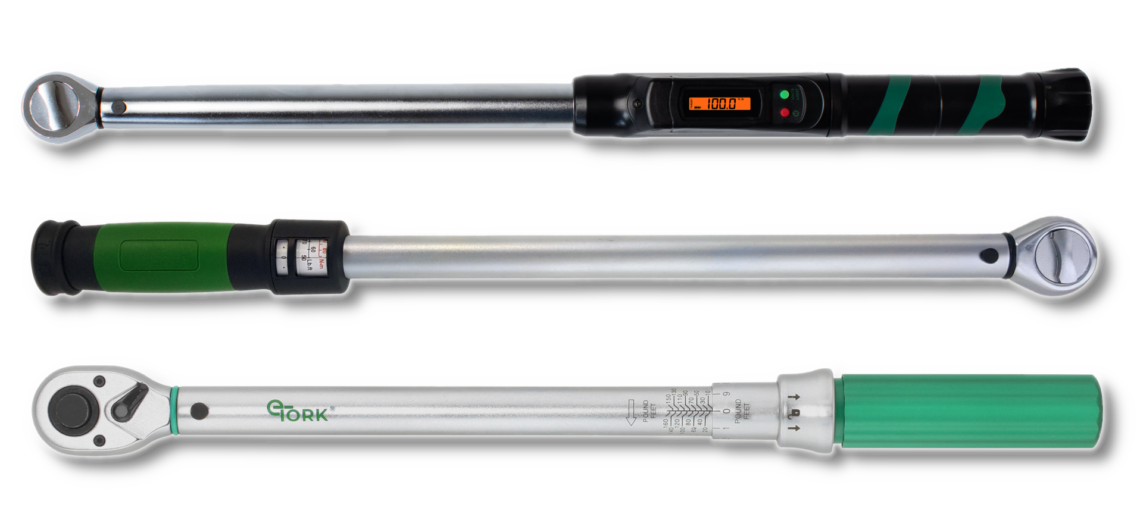Types of Torque Wrenches: A Guide to Choosing the Best Tool
When it comes to mechanical work, the precision of your tools can make all the difference between success and failure. Different types of torque wrenches are indispensable for ensuring that bolts and nuts are tightened to the exact specifications required. This is crucial because improper tightening—whether too loose or too tight—can lead to significant damage, such as warped engine components or even catastrophic failures in safety-critical systems like brakes and suspension. For both professional mechanics and DIY enthusiasts, choosing the right torque wrench is essential to maintaining the integrity and safety of your projects.
In this guide, we’ll explore the various types of torque wrenches for sale, compare them to other common wrenches, and offer tips on selecting the best one for your project, so you can avoid costly, dangerous mistakes and ensure your work stands the test of time.
5 Types of Torque Wrenches: What You Need to Know
With so many types of torque wrenches available, choosing the right one can feel like navigating a maze. Different sizes, scales, and features can make it confusing to determine which tool is best for your needs. Especially when you realize that a digital torque wrench isn’t the same as a digital scale torque wrench, and that subtle distinctions like these can have a big impact on your projects. Whether you’re tightening bolts on an engine or assembling precision machinery, familiarizing yourself with all your options ensures that you select the right tool to deliver the precise torque you need—without the guesswork.
1. Click Torque Wrenches
Click torque wrenches are the most popular and widely used type. They emit a “click” sound when the set torque value is reached, making them user-friendly and highly reliable. Among these, micrometer torque wrenches are a popular choice. They allow for fine adjustments and are calibrated in small increments, making them perfect for jobs that require precision.
Use Cases: Automotive repairs, general mechanical work, and assembling furniture.
Pros:
- Audible and tactile feedback.
- Versatile for a wide range of applications.
- Generally more affordable.
Cons:
- Requires regular calibration.
- Can be over-torqued if not used correctly.
2. Beam Torque Wrenches
Beam torque wrenches are one of the oldest types and operate on a simple mechanical principle. The pointer remains in place while the beam deflects, indicating the torque value.
Use Cases: Basic automotive work, home maintenance, and low-budget projects.
Pros:
- Simple design with no need for calibration.
- Durable and long-lasting.
- Typically cheaper than other types.
Cons:
- Less precise compared to other types.
- Difficult to read in low-light conditions.
3. Dial Torque Wrenches
Dial torque wrenches offer a higher level of precision, with a dial gauge displaying the torque applied. They are commonly used in professional settings where accuracy is critical.
Use Cases: Aircraft maintenance, precision engineering, and high-performance automotive work.
Pros:
- Highly accurate.
- No audible click, reducing the risk of over-torquing.
- Suitable for delicate applications.
Cons:
- More expensive than click and beam wrenches.
- Requires careful handling to avoid damage to the dial.
4. Digital Torque Wrenches
Digital torque wrenches provide an electronic display that shows the exact torque applied, offering more precision.
Use Cases: Professional automotive work, industrial applications, and anywhere precise torque measurement is needed.
Pros:
- Easy-to-read digital display.
- High precision with digital feedback.
Cons:
- More expensive and complex than other types.
- Battery-dependent.
5. Digital Scale Torque Wrenches
Unlike traditional digital torque wrenches, digital scale torque wrenches, like those offered by eTORK, incorporate digital scales but aren’t fully electronic. These tools combine the benefits of digital readouts with the reliability of mechanical operation.
Use Cases: Automotive, industrial, and precision engineering applications.
Pros:
- Combines mechanical reliability with digital precision.
- Suitable for users familiar with traditional wrenches but needing enhanced accuracy.
Cons:
- Not as advanced as fully digital models.
- Can be more expensive than standard click or beam wrenches.

How Torque Wrenches Compare to Other Types of Wrenches
When it comes to fastening tasks that require precision, torque wrenches stand in a league of their own. Unlike regular wrenches, which are more about brute force than finesse, torque wrenches are designed to apply a specific amount of torque to a fastener, ensuring it’s neither too loose nor too tight. This precision is crucial in many applications, from automotive repairs to assembling delicate machinery.
Other common wrenches, like adjustable wrenches, combination wrenches, and pipe wrenches, have their place in a toolbox, but they fall short when precision is required. Adjustable wrenches are versatile and can handle various fastener sizes, but they lack the accuracy needed for tasks where specific torque levels are critical. Combination wrenches, with their open-end and box-end design, are great for general tightening and loosening, but they offer no control over torque, leading to potential over-tightening. Pipe wrenches, while excellent for gripping and turning pipes, are heavy and lack the precision needed for torque-sensitive tasks.
Advantages of Torque Wrenches over Regular Wrenches
- Precision: Torque wrenches allow for precise control over the amount of force applied, ensuring optimal tightness.
- Safety: Properly torqued fasteners reduce the risk of mechanical failures, which can lead to accidents or equipment damage.
- Durability: Prevents over-tightening, which can strip threads or damage fasteners, extending the life of both the tool and the components.
- Consistency: Ensures that every fastener is tightened to the same specification, which is essential in applications like engine assembly or structural work.
While regular wrenches are indispensable for many general tasks, they simply can’t compete with the precision and reliability that a torque wrench offers when the job demands exact torque specifications. For any serious mechanic or DIY enthusiast, investing in a torque wrench is a no-brainer to avoid costly mistakes and ensure the longevity of your work.
Key Considerations When Comparing Torque Wrench Types
Picking the right torque wrench isn’t just about grabbing the first one that looks good on the shelf. There’s a bit of science—and a lot of experience—that goes into making sure you’re using the right tool for the job. Before you pull the trigger on a purchase, here are some critical factors to weigh:
Accuracy
If there’s one thing you don’t want to compromise on, it’s accuracy. Whether you’re torquing down a cylinder head or securing a bolt on a suspension system, getting the torque just right is non-negotiable. Click and digital scale torque wrenches tend to offer the best precision, but remember: they need regular calibration to stay on point. Skipping this step could mean the difference between a secure fit and a costly mistake. It’s a good idea to keep a schedule for calibrating your torque wrench, especially if you use it frequently.
Size
Torque wrenches come in different sizes, both in terms of physical dimensions and the measurement scales they use—typically inch-pounds or foot-pounds. Inch-pound wrenches are ideal for smaller, more delicate tasks like working on bicycles or small engines, where precision is key. Foot-pound wrenches, on the other hand, are better suited for larger fasteners and heavy-duty jobs like automotive or truck maintenance. Consider the types of projects you’ll be tackling most often and choose a wrench that matches the scale of your work.
Scale Types
Understanding the scale on your torque wrench is key, especially when you’re dealing with different units of measurement (like inch-pounds versus foot-pounds). eTORK’s digital scale torque wrenches offer a clear, easy-to-read display that takes the guesswork out of the equation. But don’t confuse a digital scale torque wrench with a fully digital torque wrench—they’re not the same beast. The digital scale simply offers a more precise reading, while a fully digital wrench might come with added features like data storage and multiple measurement modes.
Durability
You want a torque wrench that’s built to last. Look for models made from high-quality steel with protective coatings to fend off rust and wear. This is especially important if you’re working in environments where your tools are exposed to the elements.
Usability
Ergonomics can’t be overlooked, especially if you’re using the tool for extended periods. eTORK’s wrenches are designed with comfort in mind, featuring grips that reduce hand fatigue and scales that are easy to read even in low light. Try holding the wrench before you buy to ensure it feels right in your hand. A tool that’s awkward to use will just make the job harder.
Cost
While it’s tempting to go for the cheapest option, remember that you often get what you pay for. A more expensive torque wrench might seem like a splurge, but if it offers better accuracy, durability, and ease of use, it could end up saving you money in the long run by preventing damaged components and rework.
Maintenance
Finally, think about how easy the wrench is to maintain. Some models require more frequent calibration or are more difficult to service than others. Regular maintenance isn’t just about keeping the tool working—it’s about ensuring your work remains accurate and reliable. Tip: Invest in a calibration tool or service, and don’t neglect regular checks on your torque wrench’s accuracy.

How to Choose Between Different Types of Torque Wrenches
Finding the right torque wrench comes down to matching the tool to the specific job at hand. Whether you’re working on a car, a bike, or heavy machinery, choosing the right wrench ensures you get the job done right the first time around.
Consider the Application
Identify the tasks you’ll be performing. For automotive work, a click torque wrench or digital scale torque wrench might be your best bet. If you need something more precise for aircraft or high-performance automotive applications, consider a dial torque wrench.
Match the Wrench to the Task
- Automotive Work: Click or digital scale torque wrenches are ideal for ensuring proper tightening of engine components.
- Bicycle Maintenance: A beam torque wrench is often sufficient for delicate tasks like adjusting derailleur bolts.
- Heavy Machinery: Dial torque wrenches offer the precision needed for industrial settings.
Evaluate Usability
Consider factors like ease of use, readability of the scale, and ergonomic design. For example, eTORK’s digital scale torque wrenches offer a comfortable grip and an easy-to-read display, making them a great choice for extended use.

eTORK Torque Wrenches: Quality Meets Affordability
At eTORK, we prioritize quality and precision in all our products. We specialize in micrometer and digital scale torque wrenches, ensuring that every tool we offer meets the highest standards of accuracy and durability. Our micrometer torque wrenches are designed for professionals who demand precise torque control, providing a reliable click sound at the set torque level to prevent over-torquing. Meanwhile, our digital scale torque wrenches combine the dependability of traditional wrenches with the accuracy of modern technology, featuring easy-to-read digital displays that are perfect for tasks requiring critical precision.
Customers consistently praise the reliability and precision of our torque wrenches. One customer noted, “Most accurate and easy to read torque wrench that I have ever owned,” while another shared, “Great value. Impressive build and quality for the price.”
Discover Types of Torque Wrenches Available at eTORK
Choosing the right torque wrench isn’t just about getting the job done—it’s about doing it right, every time. At eTORK, we understand that whether you’re a seasoned pro or a weekend warrior, you need tools that you can count on. That’s why we offer a range of torque wrenches designed to meet your exact needs, no matter the project. Ready to find the perfect wrench? Take a look at our torque wrenches for sale and see what fits your needs best. And if you’re still unsure or have any questions, don’t hesitate to reach out—we’re here to help guide you to the right tool for the job.




